Mangaluru, May 29: DYFI state president Muneer Katipalla attributed the pathetic condition of the Mangaluru city to the negligence of the city corporation.
Within hours of monsoon rains started in the city, hundreds of houses and roads were inundated in rainwater creating emergency situation. The storm water drainages were encroached in the city. Lack of planning and foresight during developing the roads and layouts constructing the buildings and other development works and lack of preparedness to face the monsoon has left the city haywire during rainy season, he said.
The district administration should take up relief measures on a war-footing level to protect the people who are in distress. It should set up makeshift shelters and ensure compensation for the losses. Considering the serious situation, the state government should send a team of officials to ascertain the losses and provide financial assistance, he demanded.
The unscientific work during the construction of the highway, conversion of agriculture land, low lying areas on the outskirts of the city, storm water drainages and others into layouts and construction of apartments were the main reasons for the present situation. If the city corporation took proper measures to let the rainwater while developing the layouts and constructing houses, this situation would not have happened, he said.
The DYFI has complained the district administration several times about this situation. But the officials and elected representatives have colluded with the land and real estate mafia. They have raised their voice against such issue at Kottara Chowki. But now, it was the place where more damage was happened. So, the government should take stringent action against the erring officials to avoid such incidents in future, he demanded.
Let the Truth be known. If you read VB and like VB, please be a VB Supporter and Help us deliver the Truth to one and all.
Dubai: Smoke was seen rising from an area near the United States Consulate in Dubai, according to witness accounts cited by Reuters.
There was no immediate official confirmation on the extent of damage or whether there were any casualties in the incident.
Earlier, the US embassy in Riyadh, Saudi Arabia’s capital, was also attacked. Authorities reported damage to the premises, but no casualties were recorded.
The developments come amid heightened tensions in the region, with Iran continuing to target US interests in the Middle East following deadly attacks launched on Saturday by Israel and the United States.
Near US embassy in Dubai pic.twitter.com/z5VTZNVxNO
— Sahil Shah (@thesahilsshah) March 3, 2026





